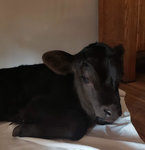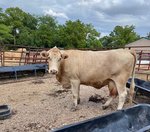


It is no secret that the cost of everything has gone up. From the grocery shelves to the gas tank, American’s are paying more for pretty much everything.
It is easy to get caught up in the thinking that “if I’m paying more, someone else is making more” but that line of thinking doesn’t hold true-especially for local farmers. Between rising costs and a drought that has held strong for months, local farmers are struggling to stay “in business”.
“…fuel has more than doubled, feed has doubled. Protein tubs last year was $115.00, they are now $143.00 for the tub. Mineral has taken a price increase, hay-you’re looking at a 50% price increase, which is due to the drought and fertizler,” explained Shawn Ricks a local “cow-calf” farmer in Niangua, MO.
Ricks raises calves. His cows have calves and they raise them together for six months, then they pull the calves off and take them to market. Those calves are sold at market and eventually end up in the grocery store.
Adam Bohannon a beef farmer out of Conway, MO shares a similar story. “The cost of feed has skyrocketed astronomically. In the beginning of the year, what was costing me about $14 a hundred, it’s $28 a hundred right now,” explained Bohannon. (A hundred is the equivalent to a hundred pounds of feed.)
With the drought this year, both farmers expressed a concern over the amount of hay they were able to bring in. “We run twenty mamas,” shared Ricks. “We feed 150 bales a winter and right now I’m sitting on 72 bales. I’m praying every day that a second cuttin’s going to come up.”
Ricks who cuts his own hay is short over half the bales he will need to feed his cattle for the winter and the drought has him worrying the might have to dip into that sooner than planned. Due to the rising cost of fertilizer, Ricks wasn’t able to fertilize this year.
“I can think of one field in particular that I cut that usually makes around 120-140 bales. We fertilize this field every year. We fertilized this year and we got 70 bales out of it,” shared Bohannon who has a similar fear over the drought and frustration at rising costs. “Fertilizer (cost) is ridiculous, you had $5 diesel fuel on top of that, baling twine and net wrap-that’s all gone up. You’re breakdowns, your parts, availability of parts-getting the parts you need when it’s broke. I blew a hydraulic line out of the tractor and it took four weeks to get that.”
Both farmers are feeling the pressure of the price increases and the drought. The fear that comes with knowing the cattle need fed to make it through winter and no sign of a second cutting in sight, on top of falling prices at market.
“I sold some cows two weeks ago, and while they did well, the cost of what they brought vs. the cost of what it cost to get them there-it’s just not feasible,” reflected Bohannon. “It’s to the point we’ve been talking about just selling out and hoping we can try again later.”
“It’s taken me and my wife 17 years to get where we are at,” shared Ricks on his family cattle business. “…farmers always tell ourselves, ‘we’re one drought away from losing everything’, because we don’t know when the bad one is going to come, and I think it’s here.”
“Some rain would be great,” Bohannon chuckled. “It’s getting scary….my well at the house…we’ve had a couple scares where it runs dry….the ponds are going dry.”
Ricks has been trying to plan ahead and make the best decisions for his farm. Ricks has been holding back steers to sell directly to people who might need a beef to butcher.
“If people in the community want to help farmers, go to your local farmer and buy a beef from him…,” expressed Ricks. “Instead of going to Wal-mart and buying a bunch of meat, go down the road and talk to the farmer, see if he’s got a beef he can sell ya to get butchered…it may be what helps him survive.”
Bohannon agrees that contacting a local farmer to purchase a beef would be helpful. “Come and buy a beef off us-…we might be a little higher than the grocery store when it comes to the entire animal because you don’t get it all-when you butcher one you don’t get the entire 1,000 pounds back, but realize and understand that there is a lot of money, time and love that goes into it...that’s all farming is anymore-the love of doing it, there’s not money in farming.”
“We work to farm,” reflected Ricks of his passion for farming. “I’m gonna fight til the end to not lose it (the farm). I’ll do whatever I gotta do to try and keep what I’ve got.”
Comments
No comments on this item Please log in to comment by clicking here